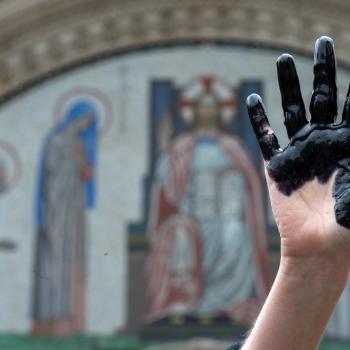
Source: unknown photographer /pxhere
Water is good. Water is necessary for life. We need water. We need to drink water. We are mostly made up of water. But too much water will kill. The fact that water can kill does not make water bad: it only shows the relative value of water and the balance which we need to have with it. If we have too little, we die, and if we have too much, we die.
Oxygen, likewise, is good. We need it. We breathe it. But too much oxygen, likewise, will kill. This, once again, does not make oxygen bad. Like water, it is good, a necessary good, but it is also a relative good. Too little, and we die. Too much, we die.
There literally can be too much of a good thing. That is, when dealing with limited, particular goods, they have a particular purpose and setting in which they fit. Proper use, proper application, proper positioning of such goods is important. Pointing out that excess is dangerous, that such excess is imbalanced and can lead to all kinds of bad ends, does not make them any less good. It only indicates that their goodness is not absolute, and we must not try to treat them as anything more than what they are: relative goods.
To argue that a relative good can become excessive and become something other than good is to realize the nature of relative goods. They must not be turned into absolutes, ignoring their relative value. The good remains good, even when it is disordered and abused. When they are encountered in an unfit, disordered fashion, it is that disorder which is not good. When we act, as St. Augustine explained, we act in accordance with the apparent good: we see a particular good, and aim for it. Sin, evil, comes when we that good is imbalanced, when it cuts out or eliminates qualities of the good which are necessary for a proper, harmonious relationship with the absolute good.
Saying we must coordinate the good within reason does not undermine the good, rather, it is the proper appropriation of the good itself. Evil is the perversion of the good, taking a particular good and making it something which it is not, often by making a particular, relative good into something greater than it is so as to ignore other goods, other needs, other qualifications in order to follow the fullness of the good itself. The particular good of water remains as it always was, even if and when we drown in it.
This, then, must be understood when talking about families, family size, and overpopulation. It is possible to have too much of a good thing. Therefore, it is possible to have overpopulation. Obviously, human life is good, and in a fashion, infinitely good (to be sure, it is best to say such infinite value is a relative, not absolute, infinity). Such overpopulation can be local, such as an overcrowded city, or it can in theory become a worldwide problem. There is a limit to the population which the world can sustain.[1] Greater population sizes requires greater resources, such as food and drink, which means a greater amount of space used for the production of those resources. The greater the size, the less space there is left for such production of resources, until at last, the space is no longer there, and the production of resources becomes negative in proportion to the size of the population. This, obviously, will lead to great misery to those who are unable to attain their needs: often the rich and powerful will be able to get what they want while the poor and weak will be at their mercy.
Likewise, in the production of such resources needed for the preservation of a given population, other natural goods tend to be affected: there is a level of balance which can be maintained before the environment is negatively affected, and once that natural balance of the environment is lost, the world and what is in it will be put at risk. There is also the question of what kind of life will be available when the population is excessive: what dignity will there be had for them when they cannot get work, when they cannot find food, when they cannot find places to live? Moreover, we must be honest in regards technology and work: with technology, less workers will be needed to produce the goods consumed by society. Even if society does not strangle itself with overpopulation, there will not be enough work for everyone, and unless society changes its economic system to justly distribute the goods to all, there will be problems with high populations that will lead to the destruction of the dignity of life itself, which of course, will be ironic, if population control is denied under the name of “life” itself. This means, even before overpopulation becomes a problem leading to death and destruction, economic injustices will have to be overcome, lest the poor suffer even more as the population increases.
We must, therefore, remember that human life is good. Reproduction establishes that good, and so is also a good. Reproduction should not be a good for those who are rich and powerful alone, but a good for all. However, prudence must always be involved in family planning. Like other goods, reproduction has a limit before it becomes excessive, and leads to problems, some of which might lead to the extinction of the human species if we are not careful. With the impact human society has on the environment, that is, with the impact human society is having on the quality of life on earth itself, it is important to realize the proper balance, and to do so fairly and justly so the poor do not suffer more because of the imprudence of the rich.
We must be careful. There are many bad ways which can be suggested in order to deal with the problems of overpopulation. For example, the poor and needy, the homeless or those without jobs could easily be seen as the excess which must be eliminated, and so the rich and powerful will find ways to have them killed off. To do this would denigrate life, and the bloodbath would do nothing to deal with the problem of overpopulation: it would only postpone it as the rich and powerful avoid acting responsibly in the world. We must do what we can to establish the social safety net, but also the environmental safety net, in ways which are moral, so that we do not face the consequences of overpopulation, nor the consequences which follow from doing what is gravely evil.
This might seem radical. Life, after all, is good, and the generation of life, reproduction, is good. How can we suggest that we put any form of limit to such reproduction? And yet, we already understand that not all acts of reproduction are good: rape, is evil, even if a child conceived in rape can be seen as good.[2] We must avoid idolizing reproduction, turning it from a means of doing good to an absolute good which cannot be questioned. Early Christians, to be sure, did not see reproduction in the way modern Christians talk about it: they saw it as a limited good, but they wondered to what extent that good should be celebrated. This is why they saw other goods, such as virginity, rivaling the good of reproduction and indeed often served as the path people should take (especially when they thought the world was going to end within their lifetime). Because of the way many modern Christians proclaim the goodness of children, it would seem that no one should ever remain a virgin, because they would be limiting the possible good in the world: however, the early Christians did not think reproduction, as such, was necessary for Christians, and that the good had in the production of children should not be exalted into an idolatrous position. Indeed, they would question the way some judge other families by the number of children they have, for they would wonder why have many children itself would ever be the goal. The good of children, like other goods, can become too much, and cause problems for families when there are too many: who will feed them, who will clothe them, who will nurture their minds, when parents find themselves with too many for them to handle?[3]
There is, therefore, good reason for us to consider family sizes. Clearly, it is not one size which fits all. Those who have one or two children, or those who have none, should not be frowned upon, as if they are limiting their potential to generate children and, therefore, limiting their potential good. Excess can be dangerous. The good of children does not just increase as more children are generated. They are not mere objects in that manner. We need to consider the impact of the human population on the world, and see what balance needs to be struck, recognizing that those who ponder if they should ever have children as a result of overpopulation are not necessarily off from their reasoning. This is not to say no one should have children, but clearly, we cannot think as if we can go on indefinitely, generation from generation, having more and more children filling the earth: there is a limit before the whole world will collapse and everyone will die off as a result. To those who argue we must have more children to make sure the previous generations will be taken care of and replaced in the workforce, technology and what actual work will be needed as a result, tells us otherwise: we must look beyond the context of older ideologies of work which did not have to deal with modern technology and look, instead, as to what work is actually needed and realize that replacing workers with more workers is not what is going to happen in the future. Therefore, the population does not need to keep at the same level in order to thrive from generation to generation, as some have been led to think.
The world is a system with a delicate balance. Human population is a part of that balance. For humanity to continue, we will need children. Too little, and we might end up not having enough to sustain humanity in the world, and humanity will perish from the face of the earth. Too many, and we will kill ourselves off from the excess. To understand this is not to deny the good of children, but rather, to affirm that good by letting it thrive in the best possible conditions.
[1] While it is important to determine what that level is, which could be something that is fluid based upon technological advances, it is the kind of detail which comes later, only after the general principles which need to be engaged are understood.
[2] Other examples in which we can see such reproduction is wrong can be found, for example, with incest, or with young children under twelve having sex and getting pregnant.
[3] This argument should not be used by the rich to limit the poor from having children, however, it is important to realize that such prudential questions should be asked by married couples. Society should have resources to help the poor and needy so that they can have families of their own.
Stay in touch! Like A Little Bit of Nothing on Facebook













